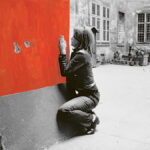 Frauenmuseum Hittisau (Web) und Lechmuseum (Web)
Frauenmuseum Hittisau (Web) und Lechmuseum (Web)
Laufzeit: 01.07.2023-27.10.2024
Orte: Frauenmuseum Hittisau, Hittisau im Bregenzerwald und Lechmuseum, Lech am Arlberg
Eröffnung: 01.07.2023, 17.00 Uhr in Hittisau
Putzen ist Schwerarbeit, ist Ritual, ist gesellschaftliche Vorgabe, ist ein Ordnungssystem für ein dualistisches Denken zwischen rein und unrein, schön und hässlich, hell und dunkel, weiblich und männlich, moralisch und amoralisch, sicher und unsicher, zivilisiert und wild, inklusiv und exklusiv.
Putzen ist eine häufig ungeliebte, zeitraubende Kulturtechnik getragen von einer Ordnungssymbolik, die viele Bereiche unseres Lebens durchdringt. Wer, wann, wie und womit putzt, bedient und nährt gleichermaßen diesen von breitem Konsens getragenen Dualismus. Rollenbilder und Machtverhältnisse werden sichtbar – wie ein Großteil der unbezahlten Care-Arbeit wird auch die Haushaltsreinigung immer noch hauptsächlich von Frauen*, People of Color, Armen erledigt. Dies bildet einen zentralen Bereich der Ausstellung.
Was aber ist Schmutz? Wo kommt er her? Welche Sicht auf die Welt verbinden wir damit? Beschränkt sich das Putzen auf den Haushalt? Mit Fragen wie diesen geht die Ausstellung unterschiedlichen Aspekten des Putzens, der Reinigung und der Reinheit nach. Dabei werden Themen aus Ökonomie, Migration, Ökologie und Nachhaltigkeit, Religion und Spiritualität erörtert.
Führungen im Frauenmuseum Hittisau können ab 10. Juli 2023 gebucht werden.

 ALBERTINA
ALBERTINA 
 Centrum für Postcolonial und Gender Studies, Univ. Trier
Centrum für Postcolonial und Gender Studies, Univ. Trier  Universität für Angewandte Kunst Wien – Angewandte Festival
Universität für Angewandte Kunst Wien – Angewandte Festival